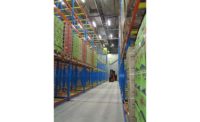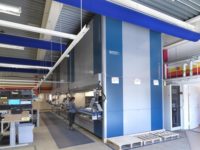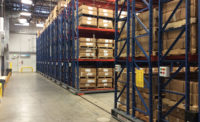Americold knew a significant amount of the rack in one of its facilities was outdated, but could not stop operations at the Wisconsin warehouse to implement a rack replacement. So, to accomplish a refurbishment while maintaining existing operations, Americold tapped Steel King Industries, a Stevens Point, Wis.-based rack manufacturer. The resulting project increased both the amount of storage space and load capacity, significantly increasing available pallet positions.
Cold storage retrofit challenges
Americold is a third-party logistics (3PL) company serving producers, retailers and foodservice providers with a network of 177 temperature-controlled warehouses. The Atlanta-based firm works on a range of temperature-controlled supply chain activities, including public warehouses, facilities physically attached to customer production facilities, port facilities, regional consolidation centers and dedicated customer-managed facilities.
The Wisconsin facility utilized a drive-in racking system, which is a high-density storage system that allows direct forklift access. Rather than supporting pallets with load beams, with drive-in, pallets rest on horizontal rails at either side of the lane. Forklift operators drive into the system to load and unload pallets.
Drive-in racking provided a balance between storage density and retaining selectivity, but the racks were outdated and had sustained substantial wear.
However, there are numerous challenges in retrofitting cold storage facilities, especially one that cannot be shut down during renovation.
“Rack replacement in an existing facility requires a lot of coordination, and there are operational issues around having to continue to operate the business,” says Phil Beaulieu, director of engineering for Americold. “Steel King was willing to work with us to design around the racking that we wanted to keep and to develop a rigorous retrofit schedule that enabled a rolling install.”
The working environment also posed a challenge for the rack design crew, project manager and installers alike. The site survey and rack build required many long hours with staff bundled in freezer suits and heavy gloves, measuring and documenting building structures and obstacles in temperatures of -10°F.
“We didn’t have the luxury of designing a facility from our desks,” says Beth Randrup, Steel King’s project manager. “With an older building, the original architectural drawings are not always 100% accurate, and field measurements are essential.”
Working space was at a premium. Installers had to find efficient spaces for their tools and equipment, materials to be banded for removal and materials to be staged for installation, without interfering with operational traffic. Steel King kept on top of the schedule, with just-in-time product deliveries.
Rigorous retrofit schedule enables rolling install
Steel King worked closely with Americold’s engineering department and facility manager to schedule demolition, deliveries and installation to meet their schedule with minimal disruption.
“They made the process pretty much seamless,” says Beaulieu.
The rack demolition crews kept one sector ahead of the installation crews. As one area was complete, it would be filled with the product from the next area to be demolished. This kept the number of out-of-commission storage bays to an absolute minimum.
Focus on durability and reduced maintenance costs.
In addition to the pressing concern of keeping the facility fully operational during the installation, Americold also was mindful of selecting the right equipment to minimize future maintenance issues and replacement costs. Cooling a space the size of a warehouse comes at a premium. The denser the storage, the easier it is to cool, so narrow aisles are inherent in a facility of this type. Compounded by the dimly lit workspace and the speed at which lift drivers operate, forklift impact on the rack is inevitable. The Steel King designers mitigated these issues with a variety of design improvements:
· Custom-engineered uprights featuring heavy horizontal braces within the rack frame.
· Cantilevered legs designed some sections of rack with offset front uprights to keep the rack column out of the forklift path.
· Additional rack-protection features:
o Welded-on column protectors to enhance the frame strength where it is most vulnerable to impact.
o Rub rails along the aisle-side of the rack.
o Custom-designed guards at the ends of the rows.
An added benefit to the rack redesign was the increased storage space over the dock doors.
“Optimization of usable space is key,” says Randrup. “By reconfiguring the design of this storage space and re-engineering the ceiling-supported system, we were able to increase both the amount of storage space and load capacity. Steel King’s team of CWI-trained welders brought their welding skills to the field to make it happen.”
Choosing the right rack partner
Americold’s Wisconsin freezer facility approached the renovation project with the goal of updating the rack system without interrupting workflow. In addition, it sought a rack partner who could provide long-term value.
Steel King’s design, advanced engineering and precision manufacturing not only improved the rack system’s durability, but it also increased the number of pallet positions.
“They are one of our preferred vendors because of the quality of their product and attention to detail. I have worked with them for 25 years, and consider them my go-to racking company,” says Beaulieu.



